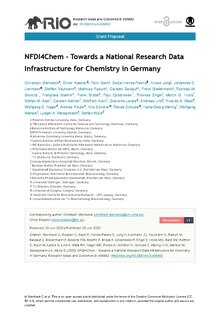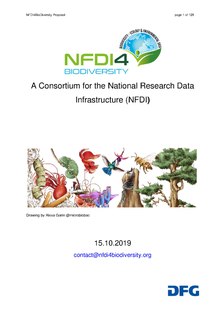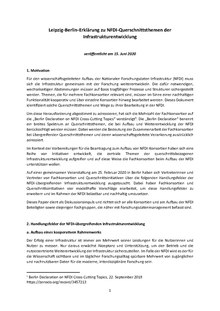National research data infrastructure
The National Research Data Infrastructure (NFDI) is a digital, distributed infrastructure that is currently being set up that will offer science in Germany services and advice on all aspects of the management of research data .
background
The National Research Data Infrastructure (NFDI) is an initiative launched by the Council for Information Infrastructures (RfII), initiated by the Joint Science Conference (GWK) and funded by the federal and state governments . It is intended to provide the German science system with a "nationwide, distributed and growing network" of services and advisory services for research data management. The corresponding federal-state agreement was concluded in November 2018. The agreed scope of funding amounts to up to 90 million euros per year in the period 2019–2028.
The motivation of the initiative comprises several aspects. First, the observation that the ubiquitous digitalization of society has also affected the field of science in all its breadth, has already profoundly changed it and will do so increasingly in the future. Second, the conviction that the competitiveness and innovation potential of German research and development are directly related to the performance and efficiency of the use of digital research data and that this efficiency may currently be. a. due to small-scale structures, project-based initiatives, limited-term funding models and a lack of standardization . And thirdly, the observation that corresponding initiatives have also been started at European level (in particular the European Open Science Cloud ) to which the German research landscape should be able to connect and to which Germany can make a contribution with the NFDI.
The decisive impetus for the NFDI initiative and its design came from several papers by the Council for Information Infrastructures (RfII), which were published between 2016 and 2018. The initial situation is analyzed in detail in the report Performance from Diversity from May 2016. The step-by-step paper was a first step towards establishing an NFDI - or: What does who bring? from April 2017, in which some possible goals of an NFDI and the requirements on the part of the scientific communities on the one hand and the infrastructure partners on the other hand were described. The paper Cooperation as an Opportunity from March 2018 outlines a number of features of an NFDI, including the following points: design, type of user involvement, formation of consortia, structure and governance as well as quality management, international connections and resource requirements. Finally, in December 2018, the paper In Width and Research-Oriented: Consortia Capable of Action was published as the last discussion impulse of the RfII for the time being. This paper focuses on the design of the individual consortia and describes how the users of the NFDI are involved and how the individual consortia can be tailored (for example thematically or methodically). The paper also emphasizes the importance of promoting a “data culture” and corresponding competencies across the board of science. Finally, it describes ways of building a layered service portfolio with shared generic and domain-specific services based on them.
aims
According to the RfII, the aim of the NFDI is "to create a reliable and sustainable service portfolio that covers generic and subject-specific needs of research data management in Germany." This service portfolio should result from the interaction of many actors, so that a "polycentric network" forms. The DFG describes the objectives of the NFDI as follows: "The national research data infrastructure (NFDI) is to systematically develop, sustainably secure and make accessible the databases of science and research and to network them (inter) nationally." The Joint Science Conference (GWK) formulates a press release. in November 2018: "The NFDI should set standards in data management and, as a digital, regionally distributed and networked knowledge repository, sustainably secure research data and make it usable."
structure
The federal-state agreement provides that the NFDI as a whole is given a structure in which, in particular, a consortium assembly, a scientific senate and a directorate are provided. The consortium assembly is responsible for the "substantive and technical principles" of the NFDI and will consist of a spokesperson for each consortium. The Scientific Senate is the “content-strategic body” of the NFDI and will consist of four representatives each from the consortium assembly, the Alliance of Science Organizations and the Joint Science Conference as well as the director of the NFDI. The latter should take over the chairmanship of the Scientific Senate. Finally, the directorate consists of the director with an office.
At the beginning of May 2019 it was announced in a resolution of the Joint Science Conference (GWK) that the directorate of the NFDI would be located in Karlsruhe . The Karlsruhe Institute of Technology (KIT) and the FIZ Karlsruhe are entrusted with the establishment and development of the NFDI. KIT professor York Sure-Vetter was appointed founding director of the NFDI directorate and took up his post on March 1, 2020.
The NFDI will consist of a number of so-called consortia, which are formed by the fact that scientific communities and infrastructure partners are formed around a specific, thematically, methodically, subject or specialist group-defined sub-area of the science system. Each consortium will then develop and offer a service portfolio for research data management for this sub-area. For the RfII, the "science-driven design of the NFDI" is of central importance. The DFG describes the consortia as follows:
Consortia are associations of users and providers of research data aimed at long-term cooperation and include universities, non-university research institutions, departmental research institutions, academies and other publicly funded information infrastructure institutions. As a rule, they are organized according to specialist groups or methods and aim to ensure access to and use of the research data relevant to them and to make them sustainable.
The formation of the NFDI
Consortia applications are to be submitted in three successive tendering rounds and a total of up to 30 consortia will be funded. These then together form the national research data infrastructure. The evaluation of the consortium applications is coordinated by the German Research Foundation (DFG), with the final funding decision being made by the Joint Science Conference (GWK). For the selection process, the DFG has set up a committee of experts whose task it is to “evaluate the applications on the basis of a technical, information technology and structure-related assessment, as well as to formulate funding recommendations to the GWK”. The call for proposals for the funding program was published on June 6, 2019.
Humanities and cultural studies
The mainzed with its six partner organizations in Mainz forms the core of the humanities consortia with four applications. These four Mainz projects are linked by a Memorandum of Understanding (MOU) in order to meaningfully cover overlapping areas. A funding recommendation was made to NFDI4Culture in June 2020 .
resonance
The discussion papers of the Council for Information Infrastructures have received a lot of attention in science in Germany. This manifests itself, among other things, in the statements and position papers of various actors:
- scientific networks, including initiatives from biology , chemistry , engineering or the life sciences ;
- scientific professional associations, including the Society for Musicology , the Association of Historians of Germany (VHD) and the Association of Digital Humanities in German-speaking countries;
- Science organizations, including the Alliance of Science Organizations and the Union of German Academies of Science .
The first publications in specialist journals and science-related publications on the subject of NFDI have already appeared, including from the perspective of the social sciences or library sciences as well as in the journal research and teaching .
Finally, there are also reports in the daily press, including the Frankfurter Allgemeine Zeitung and the taz .
literature
- Information Infrastructures Council: Achieving diversity. Recommendations on structures, processes and financing of research data management in Germany. Göttingen: RfII, 2016. http://www.rfii.de/download/rfii-empfänger-2016/
- Advice for information infrastructures: step by step - or: what will who bring? RfII, Göttingen April 2017. http://www.rfii.de/download/rfii-diskussionspapier-2017/
- Information Infrastructures Council: Cooperation as an Opportunity. Second discussion impulse on the design of a national research data infrastructure (NFDI) for science in Germany . RfII, Göttingen March 2018. http://www.rfii.de/download/rfii-diskussionspapier-maerz-2018/
- Joint science conference : Announcement of the federal-state agreement on the establishment and promotion of a national research data infrastructure (NFDI) . Federal Gazette, November 28, 2018. https://www.gwk-bonn.de/fileadmin/Redaktion/Dokumente/Papers/NFDI.pdf
- Information Infrastructures Council: Broad and research-oriented: Consortia capable of action. Third discussion impulse on the design of a national research data infrastructure (NFDI) for science in Germany . RfII, Göttingen December 2018. http://www.rfii.de/download/rfii-diskussionspapier-dezember-2018/
Web links
- Website of the National Research Data Infrastructure , https://www.nfdi.de
- Information Infrastructures Council , http://www.rfii.de/de/start/
- GWK , "Information Infrastructures / NFDI", https://www.gwk-bonn.de/themen/weiter-arbeitsgebiete/informationsinfekturen-nfdi/
- DFG , http://www.dfg.de/foerderung/programme/nfdi/
- "Position papers and press releases" on the website of the Research Infrastructures Initiative for the Humanities , http://forschungsinfrastructureen.de/doku.php/positionspapiere
Individual evidence
- ↑ a b c d e f Joint Science Conference : Announcement of the federal-state agreement on the establishment and promotion of a national research data infrastructure (NFDI) . Federal Gazette, November 28, 2018, §6.
- ↑ a b c d Council for Information Infrastructures: Achievement from diversity. Recommendations on structures, processes and financing of research data management in Germany . RfII, Göttingen 2016.
- ↑ a b c d Advice for information infrastructures: Step by step - or: What does who bring? Ed .: Council for Information Infrastructures. RfII, Göttingen April 2017, p. 2 .
- ↑ a b Joint Science Conference: Press release: Securing research data sustainably and making it usable - starting shot for a national research data infrastructure . Ed .: GWK. GWK, Bonn November 16, 2018 ( gwk-bonn.de [PDF]).
- ↑ a b c Council for Information Infrastructures: Cooperation as an Opportunity. Second discussion impulse on the design of a national research data infrastructure (NFDI) for science in Germany . Ed .: Council for Information Infrastructures. RfII, Göttingen March 2018 ( rfii.de ).
- ↑ Council for Information Infrastructures: Broad and research-oriented: Consortia capable of action. Third discussion impulse on the design of a national research data infrastructure (NFDI) for science in Germany . Ed .: RfII. RfII, Göttingen December 2018 ( rfii.de ).
- ↑ DFG: National Research Data Infrastructure . In: DFG. DFG, January 25, 2019, accessed on February 6, 2019 .
- ↑ Directorate of the National Research Data Infrastructure is based in Karlsruhe. In: Karlsruhe Institute of Technology. May 9, 2019, accessed March 3, 2020 .
- ↑ Computer scientist York Sure-Vetter from KIT becomes director of the National Research Data Infrastructure (NFDI). March 2, 2020, accessed March 3, 2020 .
- ↑ National research data infrastructure. In: German Research Foundation. January 25, 2019, accessed February 6, 2019 .
- ↑ National Research Data Infrastructure (NFDI): DFG takes over the selection and evaluation of the consortia. In: German Research Foundation. German Research Foundation, December 7, 2018, accessed on February 6, 2019 .
- ↑ National research data infrastructure. In: DFG. January 25, 2019, accessed February 6, 2019 .
- ↑ mainzed annual report 2015/2016. In: Annual Report. mainzed - Mainz Center for Digitality in the Humanities and Cultural Studies, accessed on June 29, 2020 .
- ↑ Memorandum of Understanding by NFDI initiatives from the humanities and cultural studies. July 2, 2019, accessed July 21, 2020 .
- ↑ https://nachrichten.idw-online.de/2020/06/26/akademie-der-wissenschaften-und-der-literatur-mainz-wird-traegerinstitution-des-konsortiums-nfdi4culture/
- ^ German Federation for Biological Data: The National Research Data Infrastructure (NFDI) - a Cornerstone for Biological and Biodiversity research . October 25, 2018 ( gfbio.org [PDF]).
- ↑ Janna Neumann, Angelina Kraft, Nicole Jung, Oliver Koepler: Thesis Paper National Research Data Infrastructure for Chemistry (NFDI4Chem) . 2018, doi : 10.15488 / 3667 ( uni-hannover.de [accessed on February 7, 2019]).
- ↑ Robert Schmitt, Matthias Müller, Peter Pelz, Thomas Stäcker, Torsten Bronger, Irina Sens, Achim Streit: NFDI4Ing: A national research data infrastructure for engineering . 2018 ( nfdi4ing.de [PDF]).
- ↑ Juliane Fluck, Konrad Förstner, Thomas Gübitz, Birte Lindstädt, Dietrich Rebholz-Schuhmann, Ilja Zeitlin: NFDI4Life Position Paper - Research Data Infrastructure for the Life Sciences . 2018, doi : 10.4126 / zbmed2018001 ( nfdi4life.de ).
- ^ Dörte Schmidt: Memorandum of the Society for Music Research for the Creation of National Research Data Infrastructures (NFDI). In: musikforschung.de. February 9, 2018, accessed February 6, 2019 .
- ^ Association of Historians of Germany: Position paper of the Association of Historians of Germany (VHD) on the creation of national research data infrastructures (NFDI). Retrieved February 6, 2019 .
- ↑ DHD Association: Opinion of the Association of Digital Humanities in German speaking countries (DHD) and National Research Data Infrastructure (NFDI). In: dig-hum.de. July 31, 2017, accessed February 6, 2019 .
- ↑ “Research Data Vision 2025” - one step closer: a discussion paper of the research data working group of the priority initiative “Digital Information” of the Alliance of German Science Organizations :: GFZpublic Deutsches GeoForschungsZentrum GFZ . doi : 10.2312 / allianzoa.024 ( gfz-potsdam.de [accessed February 7, 2019]).
- ↑ Union of the Academies of Sciences and Humanities: Position paper of the Union of the German Academies of Sciences on the creation of a national research data infrastructure (NFDI) . Berlin February 5, 2018 ( akademienunion.de [PDF]).
- ^ Mathias Bug, Stefan Liebig, Claudia Oellers, Regina T. Riphahn: Operative and strategic elements of a powerful research data infrastructure in the social and economic sciences . In: Yearbooks for Economics and Statistics . tape 238 , no. 6 , 2018, ISSN 0021-4027 , p. 571-590 , doi : 10.1515 / jbnst-2018-0029 ( degruyter.com [accessed on February 7, 2019]).
- ↑ Jasmin Schmitz, Birte Lindstädt: The management of research data as a field of activity of scientific libraries: Research support using the example of ZB MED - Information Center for Life Sciences . January 16, 2019 ( hu-berlin.de [accessed February 7, 2019]).
- ↑ Germany gets a national research data network. February 7, 2019, accessed February 7, 2019 .
- ↑ Petra Gehring: Research Infrastructures: A River Bed for the Data Streams . ISSN 0174-4909 ( faz.net [accessed February 7, 2019]).
- ↑ Manfred Ronzheimer: Use of research data: Big data for researchers . In: The daily newspaper: taz . November 22, 2018, ISSN 0931-9085 ( taz.de [accessed February 7, 2019]).



